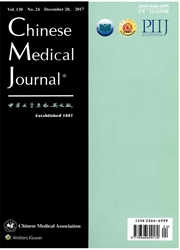

 中文摘要:
中文摘要:
背景恶化在 allogeneic 以后经常发生在有费城染色体积极的尖锐成淋巴细胞的白血病的病人的造血的房间移植( allo-HCT )(Ph+所有)在 allo-HCT 前后的最小的剩余疾病( MRD )的 .Detection rate.Early 与更高的恶化被联系在 allo-HCT 以后的 imatinib 的管理可以阻止周期性的Ph+ ALL.The 目的这研究是当时,在阻止 hematological 恶化评估 imatinib 的安全和功效 imatinib wa
 英文摘要:
英文摘要:
Background Relapse happens frequently after allogeneic hematopoietic cell transplantation (alIo-HCT) in the patients with Philadelphia chromosome-positive acute lymphoblastic leukemia (Ph^+ ALL). Detection of the minimal residual disease (MRD) before and after alIo-HCT is associated with higher relapse rate. Early administration of imatinib after alIo-HCT may prevent recurrent Ph^+ ALL. The aim of this study was to evaluate the safety and efficacy of imatinib in preventing hematological relapse when imatinib was administrated in the first 90 days after alIo-HCT. Methods Patients with Ph^+ ALL that underwent alIo-HCT were enrolled in a prospective study. A TaqMan-based real-time quantitative polymerase chain reaction (RQ-PCR) technique was used to detect the MRD (bcr-abl transcript levels). Imatinib therapy was initiated prior to 90 days after alIo-HCT if the patient's absolute neutrophil count (ANC) was above 1.0×10^9/L (without granulocyte colony-stimulating factor (G-CSF) administration) and the platelet count was greater than 50.0×10^9/L, or if the bcr-abl transcript levels were elevated in two consecutive tests, or if the bcr-abl transcript levels were 〉10.2 after the initial engraftment. The initial daily dose of imatinib was 400 mg/d for adults and 260 mg/m^2 for children (younger than 17 years). Imatinib was administered for at least I month and the bcr-abl TaqMan results were negative for 3 consecutive tests, or complete molecular remission (CR^mol) was sustained for at least 3 months. Results From May 2005 to October 2008, 29 patients were enrolled in this study, of whom, 19 patients were male and 10 were female. The median age of the enrolled patients was 33 years (range 6-50 years). Imatinib therapy was started at a median time of 60 days (range 20-122 days) post HCT (only one patient started Imatinib therapy at 122nd day after HCT). Twenty-five adult patients could tolerate a dose of 300-400 mg/d of imatinib, and three children tolerated
 同期刊论文项目
同期刊论文项目
 同项目期刊论文
同项目期刊论文
 Effects of the NK cell recovery on outcomes of unmanipulated haploidentical blood and marrow transpl
Effects of the NK cell recovery on outcomes of unmanipulated haploidentical blood and marrow transpl Partially matched related donor transplantation can achieve outcomes comparable with unrelated donor
Partially matched related donor transplantation can achieve outcomes comparable with unrelated donor High CD4/CD8 ratio in allografts predicts adverse outcomes in unmanipulated HLA-mismatched/haploiden
High CD4/CD8 ratio in allografts predicts adverse outcomes in unmanipulated HLA-mismatched/haploiden First-line therapy for chronic graft-versus-host disease that includes low-dose methotrexate is asso
First-line therapy for chronic graft-versus-host disease that includes low-dose methotrexate is asso Expression profiles of adhesion molecules on na?ve T cells in bone marrow grafts of healthy donors t
Expression profiles of adhesion molecules on na?ve T cells in bone marrow grafts of healthy donors t Superior graft-versus-leukemia effect associated with transplantation of haploidentical compared wit
Superior graft-versus-leukemia effect associated with transplantation of haploidentical compared wit Expression of CD62L on donor CD4(+) T cells in allografts: correlation with graft-versus-host diseas
Expression of CD62L on donor CD4(+) T cells in allografts: correlation with graft-versus-host diseas Characterization of CD3+CD4-CD8- (double negative) T cells reconstitution in patients following hema
Characterization of CD3+CD4-CD8- (double negative) T cells reconstitution in patients following hema Administration of short-term immunosuppressive agents after DLI reduces the incidence of DLI-associa
Administration of short-term immunosuppressive agents after DLI reduces the incidence of DLI-associa Immune-related late-onset hemorrhagic cystitis post allogeneic hematopoietic stem cell transplantati
Immune-related late-onset hemorrhagic cystitis post allogeneic hematopoietic stem cell transplantati Graft-versus-leukemia effects of Wilms' tumor 1 protein-specific cytotoxic T lymphocytes in patients
Graft-versus-leukemia effects of Wilms' tumor 1 protein-specific cytotoxic T lymphocytes in patients The inferiority of G-PB to rhG-CSF-mobilized blood and marrow grafts as a stem cell source in patien
The inferiority of G-PB to rhG-CSF-mobilized blood and marrow grafts as a stem cell source in patien Conflicting impact of alloreactive NK cells on transplantation outcomes after haploidentical transpl
Conflicting impact of alloreactive NK cells on transplantation outcomes after haploidentical transpl Modified donor lymphocyte infusion (DLI) for the prophylaxis of leukemia relapse after hematopoietic
Modified donor lymphocyte infusion (DLI) for the prophylaxis of leukemia relapse after hematopoietic Platelet engraftment in patients with hematologic malignancies following unmanipulated haploidentica
Platelet engraftment in patients with hematologic malignancies following unmanipulated haploidentica Wilms' tumor gene 1 expression: an independent acute leukemia prognostic indicator following allogen
Wilms' tumor gene 1 expression: an independent acute leukemia prognostic indicator following allogen Immunomodulatory strategies for relapse after haploidentical hematopoietic stem cell transplantation
Immunomodulatory strategies for relapse after haploidentical hematopoietic stem cell transplantation Monitoring MRD with flow cytometry: an effective method to predict relapse for ALL patients after al
Monitoring MRD with flow cytometry: an effective method to predict relapse for ALL patients after al Treating donor mice with rhIL-11 and rhG-CSF promotes transplant-tolerance and preserves the effects
Treating donor mice with rhIL-11 and rhG-CSF promotes transplant-tolerance and preserves the effects The effect of HLA disparity on clinical outcome after HLA-haploidentical blood and marrow transplant
The effect of HLA disparity on clinical outcome after HLA-haploidentical blood and marrow transplant Unmanipulated HLA-mismatched/haploidentical blood and marrow hematopoietic stem cell transplantation
Unmanipulated HLA-mismatched/haploidentical blood and marrow hematopoietic stem cell transplantation Individualized Intervention Guided by BCR-ABL Transcript Levels after HLA-Identical Sibling Donor Tr
Individualized Intervention Guided by BCR-ABL Transcript Levels after HLA-Identical Sibling Donor Tr Basiliximab for the treatment of steroid-refractory acute graft-versus-host disease after unmanipula
Basiliximab for the treatment of steroid-refractory acute graft-versus-host disease after unmanipula Diarrhea during the Conditioning Regimen Is Correlated with the Occurrence of Severe Acute Graft-ver
Diarrhea during the Conditioning Regimen Is Correlated with the Occurrence of Severe Acute Graft-ver 期刊信息
期刊信息
